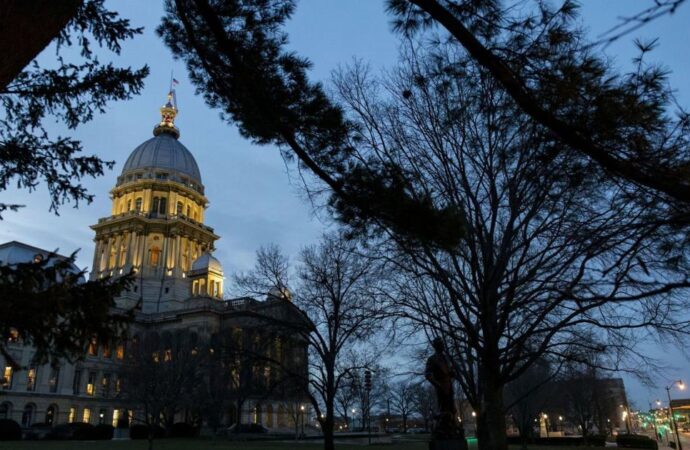Illinois House votes to endorse ‘abolition amendment,’ D.C. statehood SPRINGFIELD — The Illinois House voted Wednesday to endorse a proposed U.S. constitutional amendment that would finally eliminate what some see as the last vestige of slavery in the United States — forced labor by people convicted of crimes and sentenced to prison. House Joint Resolution
Illinois House votes to endorse ‘abolition amendment,’ D.C. statehood
SPRINGFIELD — The Illinois House voted Wednesday to endorse a proposed U.S. constitutional amendment that would finally eliminate what some see as the last vestige of slavery in the United States — forced labor by people convicted of crimes and sentenced to prison.
House Joint Resolution 7, by Rep. Mary Flowers, D-Chicago, calls for passage of the proposed “abolition amendment,” which seeks to eliminate what’s known as the “punishment clause” of the 13th Amendment, which abolished slavery after the Civil War.
The 13th amendment reads in part, “Neither slavery nor involuntary servitude, except as a punishment for crime whereof the party shall have been duly convicted, shall exist within the United States, or any place subject to their jurisdiction.”
Those words, “except as a punishment for a crime,” have been used in the years since the Civil War to require prisoners, a disproportionate number of whom are people of color, to perform manual labor, typically for little or no compensation.
Flowers
“Because you have to understand that since the beginning, African Americans have provided free labor to this country, and even incarcerated, they are providing free labor,” Flowers said during debate on the resolution. “But you forget that these men who are providing free labor while they’re incarcerated, they have families that need their support. And so if they’re working, they should be paid.”
In December, congressional Democrats introduced a joint resolution that would add another amendment to the Constitution, effectively eliminating the punishment clause. It would read: “Neither slavery nor involuntary servitude may be imposed as a punishment for a crime.”
U.S. Sen. Jeff Merkley, D-Ore., chief sponsor of the federal proposal, issued a statement saying the 13th Amendment continues to operate as a means of profiting from involuntary labor.
“To this day, many states and the federal government mandate that all able-bodied incarcerated people work,” the statement read. “Incarcerated people are not protected by workplace safety laws that help keep other Americans safe on the job. Even today, 155 years after slavery was supposedly abolished in the United States, private prison corporations profit from forced labor, as do companies that sell their goods — which are made by forced labor from un- or under-compensated people — to unsuspecting consumers.”
Gov. J.B. Pritzker on Wednesday, April 28, fields a question at Heartland Community College about whether college students could be required to get vaccinated for COVID-19 before returning to campus.
State Rep. Tim Butler, R-Springfield, noted during the debate that many state constitutions contain similar language but that some, most recently Utah and Nebraska, have passed state-level amendments removing those provisions.
Tim Butler
“So I think that gives a sense to our colleagues about the importance of this across the country,” he said. “If states are looking at their own constitutions with the same language and taking action that’s happening potentially on the federal level, it’s probably a good thing to do.”
Flowers’ resolution passed the House on a voice vote. It will next be sent to the Senate for consideration.
D.C. statehood
Also Wednesday, the House passed House Joint Resolution 16 urging Congress to pass legislation making Washington, D.C., the 51st state.
“Washington, D.C., has over 700,000 residents, more than the states of Wyoming or Vermont, and comparable to the states of Alaska and North Dakota,” Rep. Will Guzzardi, D-Chicago, said on the House floor. “However, these 700,000 Americans have no U.S. senators, no voting representation in the U.S. House, no ability to control their own budget. The city that is the seat of our great government, a 47-percent African American city, is an emblem of disenfranchisement.”
Guzzardi
Earlier this year, the U.S. House passed legislation authorizing statehood for the district, which would be renamed Washington, Douglass Commonwealth. But that legislation passed on a straight party-line vote, 216-208, with no Republicans supporting it.
It is now sitting in the evenly-divided U.S. Senate where its chances of passage are considered negligible, primarily because it would allocate two U.S. Senate seats and one House seat to the heavily Democratic-leaning new state, tipping the balance of power in Congress that much toward the Democrats.
Guzzardi’s resolution passed the Illinois House on a similar party-line vote, 71-42. It now moves to the state Senate.
Both resolutions are symbolic in nature, merely expressing to federal officials the sentiment of the Illinois General Assembly.
Those votes came on a day when the state House focused almost entirely on symbolic and honorary resolutions, including several that rename stretches of state highways in honor of fallen U.S. soldiers from Illinois.
The most affordable states to buy a house in 2021
The most affordable states to buy a house in 2021
Why do people choose to live where they do? Affordability is a major factor.
Using U.S. Census data, Rocket Homes released a list of the most affordable states to buy a home in 2021. It based rankings on the most recently available data for median home values, median household incomes, and what percentage of their monthly incomes homeowners with mortgages spend on housing costs.
1. Indiana
Indiana population: 6,732,219
Median household income: $57,603
Median home value: $156,000
Source: U.S. Census data, compiled by Rocket Homes
2. Iowa
Iowa population: 3,155,070
Median household income: $61,691
Median home value: $158,900
Source: U.S. Census data, compiled by Rocket Homes
3. Ohio
Ohio population: 11,689,100
Median household income: $58,642
Median home value: $157,200
Source: U.S. Census data, compiled by Rocket Homes
4. West Virginia
West Virginia population: 1,792,147
Median household income: $48,850
Median home value: $124,600
Source: U.S. Census data, compiled by Rocket Homes
5. Michigan
Michigan population: 9,986,857
Median household income: $59,584
Median home value: $169,600
Source: U.S. Census data, compiled by Rocket Homes
6. Wyoming
Wyoming population: 578,759
Median household income: $65,003
Median home value: $235,200
Source: U.S. Census data, compiled by Rocket Homes
7. Wisconsin
Wisconsin population: 5,822,434
Median household income: $64,168
Median home value: $197,200
Source: U.S. Census data, compiled by Rocket Homes
8. Missouri
Missouri population: 6,137,428
Median household income: $57,409
Median home value: $168,000
Source: U.S. Census data, compiled by Rocket Homes
9. North Dakota
North Dakota population: 762,062
Median household income: $64,577
Median home value: $205,400
Source: U.S. Census data, compiled by Rocket Homes
10. South Carolina
South Carolina population: 5,148,714
Median household income: $56,227
Median home value: $179,800
Source: U.S. Census data, compiled by Rocket Homes

























Leave a Comment
Your email address will not be published. Required fields are marked with *